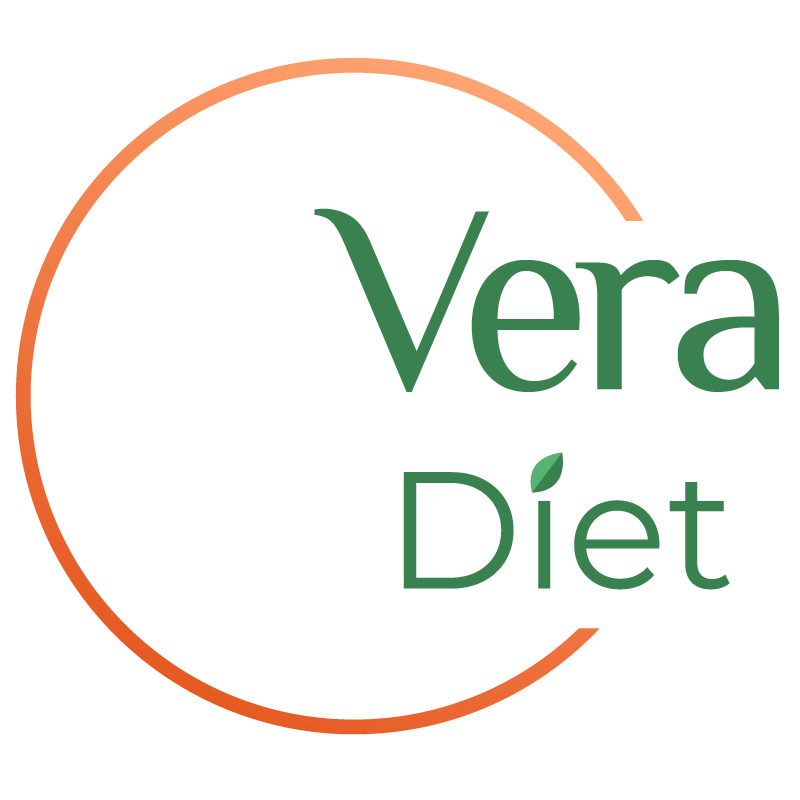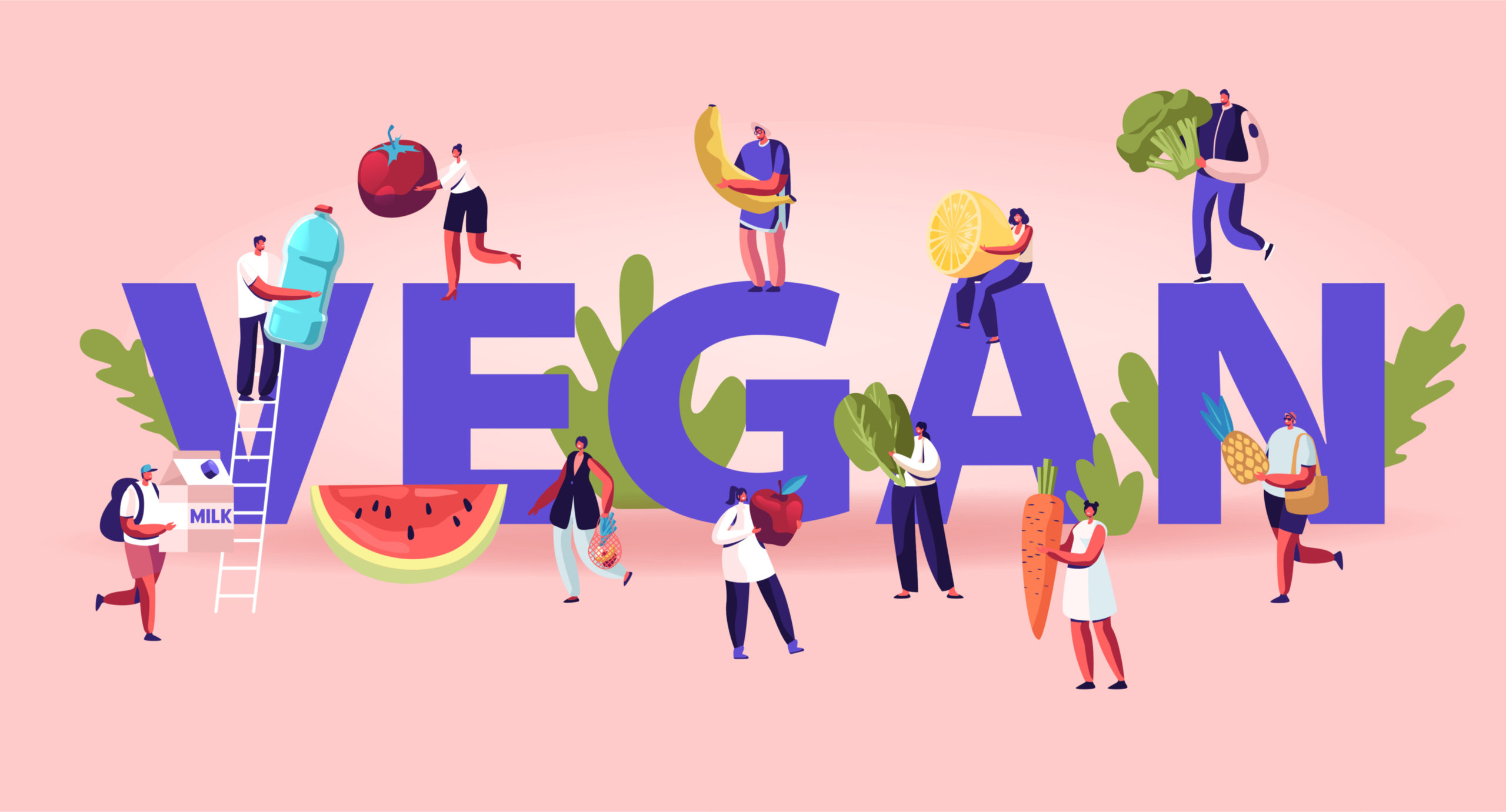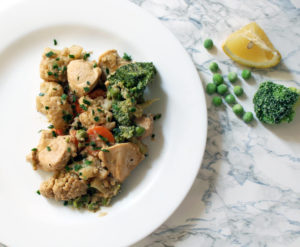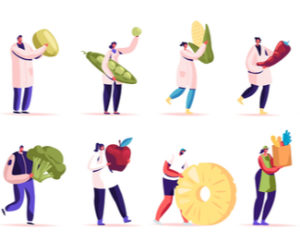The vegan diet has become super popular in the last 10 years. It still remains popular and more variations of vegan diets are emerging. As a dietitian I’d like to discuss with you the nutritional aspect of a vegan diet. Does vegan mean healthy? And most importantly, how do you make sure your vegan diet is balanced so you are not lacking any nutrients? Let’s see!
What is a vegan diet?
A vegan diet or veganism is a practice that excludes all animal products from the diet and sometimes everyday commodities like clothes, cosmetics and personal care products. So, a vegan diet excludes meat and poultry, fish and seafood, dairy and eggs, butter and animal fats, honey and so on. The term vegan was first introduced in the 1940s, although it appears that vegetarian diet already existed in 3000 BC on the territory of modern Pakistan, Afghanistan and the western part of India. The main reasons people go vegan include health, ethics, religion and environment. I’d like to highlight again that in this article I’ll focus exclusively on the health and nutrition aspects of a vegan diet.
Health benefits of a vegan diet
According to research, a balanced vegan diet can have a range of health benefits. One of the main benefits is heart health. According to multiple studies, vegan diet can help decrease the risks of cardiovascular diseases (1,2). Vegetarian diets lower total and LDL cholesterol, improving the lipid profile (3).
One study concludes that there is a general consensus that the elements of a whole-foods plant-based diet—legumes, whole grains, fruits, vegetables, and nuts, with limited or no intake of refined foods and animal products—are highly beneficial for preventing and treating type 2 diabetes (4).
A vegan diet can also lower risk of certain cancers, especially colorectal cancer. One review suggests that vegans have a 15% lower risk of developing and dying from cancer (5).
A vegan diet can also lead to weight loss, especially at the beginning. It can be due to the fact that a vegan diet is usually lower in calories than an omnivore one.
Most studies include different vegetarian diets, where vegan diet is just the strictest variation of a vegetarian diet. Even though, a balanced vegan diet has stronger health benefits, vegetarian diets also have pretty great benefits.
Health concerns of a vegan diet
Vegan diets are not created equal. Even though this logic can be applied to any diet, including omnivore, vegan diet has more chances to be unbalanced and cause nutrient deficiencies. So nope, vegan does not mean healthy by default. In the next part I’ll address the main nutrients vegans should be careful with. An unbalanced vegan diet can be dangerous and depending on the nutrient deficiency it can have different symptoms and health outcomes. For instance, let’s take the most common vegan deficiency in B12. Since vitamin B12 is crucial for red blood cells formation and nerve insulation, the lack of this vitamin can result in tiredness, shortness of breath, loss of coordination and even depression!
The thing with nutrient deficiencies is that they become visible over a certain period of time. And once the symptoms are there, supplementing may be too late to reverse certains changes. Of course I’m talking about rare cases, but it’s possible nonetheless. For example, iodine deficiency in babies and children can lead to development problems.
I wanted to highlight, that an unbalanced vegan diet might be especially dangerous for babies and toddlers. Official and unofficial nutrition authorities of some countries say that it’s ok (like USA and Canada), while most European countries send a message that it’s too dangerous. I personally don’t support veganism for infants but it doesn’t mean that it’s impossible, it is just very very complex. So if you wish for your baby to eat vegan you MUST consult a pediatrician first!
Another concern that I see is going vegan overnight. Drastically cutting out all animal foods can be dangerous, especially if you are not prepared. A vegan diet without proper planning and knowledge, can result in rapid weight loss due to undereating.
If you choose a vegan diet for health and nutrition reasons, then another downside is that it’s still a diet, meaning there is a big list of FORBIDDEN foods. As any restrictive diet, veganism might be too much for some people and affect their mental health. In some people it can also trigger eating disorders. Also, it might greatly alter one’s social life, which in its turn can again affect mental health. So veganism is a conscious choice that you should be 100% comfortable with. If not, it’s also great to have a plant-based diet and sometimes include animal foods, especially if you crave them.
Keys to a balanced and sustainable vegan diet
A balanced vegan diet is rich in vegetables and fruit, whole grains, legumes, nuts and seeds. It also includes oils, soy products and often other plant yogurts and drinks. Please note, that it’s also possible to have a vegan diet with lots of sweets, fries and vegan burgers. Of course, these foods should not be forbidden. I’m just saying that to have a balanced vegan diet and meet all your body’s needs, try to focus on whole plant foods. And just like in an omnivore balanced diet, there is always room for some dessert.
Protein
Make sure you have enough protein in your diet. On average, we need 1g of protein per each kg of body weight. This is not an impossible task. Roughly half of your protein needs should be covered by grains, nuts and vegetables. Another half should come from high-protein plant sources like legumes (beans, lentils, peas, chickpeas etc.) and soy products (soybeans, tofu, tempeh etc.). We used to believe that product combining is necessary to meet all your amino acid needs. But in reality you don’t have to pair rice with beans or do some other combinations to have all essential amino acids in one meal because if you have a balanced diet, you get all essential amino acids regardless.
To make sure you have enough protein, fill 1/4 to 1/3 of your plate with legumes or soy products twice a day. Soy milk and yogurts could help with protein intake. Today we also have a variety of vegan meat substitutes, some can be really good, but some might actually be vegetable or grain based and not have enough protein to fulfill your needs. So stay curious and read food labels of new products. In some cases, it can be a good idea to have some vegan protein supplements. In any case, I suggest all my vegan friends who are new to veganism to consult a R.D. It’s always better to have a professional opinion on your diet.
Fat
Since a substantial part of fat in an omnivore diet comes from animal produce, vegans should not be afraid of oils and other fat sources like nuts, seeds, avocados and olives. A vegan diet is rich in healthy unsaturated fats and low in less healthy saturated fats. The only fat issue is DHA and EPA omega 3 fatty acids that are found only in fish. Only a small percentage of plant omega 3s can be converted into DHA and EPA in our bodies. So make sure you get enough omega 3 plant sources like flaxseeds and walnuts or you might consider supplementation with your doctor.
Fiber
Vegan diets are usually rich in fiber, for some people it can be actually too much to tolerate. The trick with fiber is to increase it gradually in your diet. And also consuming too much raw vegetables causes bloating, so cooking them can actually be helpful.
Vitamins and minerals
- The vitamin that attracts the most attention in vegans is B12. Vegans are often deficient in this vitamin because its main sources are animal. Even though, some algae are rich in B12, its amounts aren’t sufficient to cover body’s needs. So supplementation is necessary and it’s best to see your doctor to get a prescription.
- Even though plant foods contain iron as well, iron from plant sources is not absorbed as well as the one from animal sources. If you are vegan you can boost iron absorption by adding vitamin C. So basically you can pair high-iron products like legumes, quinoa, pumpkin seeds, cashews and dark chocolate with vitamin C sources like broccoli, lettuce, bell pepper, strawberries, kiwi and oranges. If you have a balanced diet, supplementation is usually not necessary.
- The best sources of calcium are dairy products. Vegan options include fortified plant milks, soy products, legumes, nuts and seeds. But to make sure that calcium is properly absorbed, vitamin D is important. And here supplementation is needed for everyone regardless of a diet. Of course it depends on where you live and how much sun you get daily, but most countries need supplementation, especially in winter.
- And the last mineral I’d like to pay attention to is iodine. Main sources are animal like fish, seafood and eggs, so iodized salt can help meet all the body’s needs.
Practically speaking
Vegan does not equal healthy. But a well-balanced and satisfying vegan diet can have a lot of health benefits like lower risks of cardiovascular diseases, diabetes and even cancer. It’s crucial for a vegan diet to contain enough protein, thanks to legumes and soy products, and of course a variety of whole grains, vegetables, fruit, nuts and seeds. Vitamin B12 supplementation is a must. If you are not sure how to switch to a vegan diet, don’t hesitate to consult a registered dietitian. And most importantly, enjoy food!




